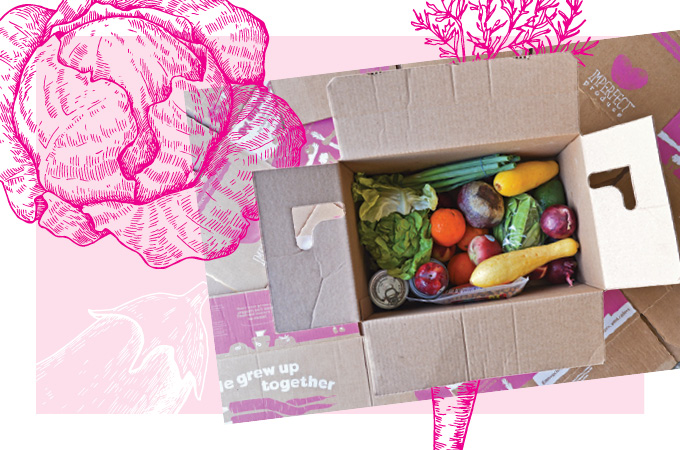When you walk into a supermarket, what is the first thing you notice? Probably the neatly stacked pyramids of perfectly colored fruits and pleasingly plump vegetables in the produce department. You’re not likely to spy spindly carrots, misshapen cucumbers or lumpy lemons. That’s because grocery stores rely heavily on appearance to attract shoppers to their displays.
So what happens to the items that don’t win points for beauty? Most of them go to waste, says Reilly Brock, content manager for Imperfect Foods (formerly Imperfect Produce), a San Francisco-based distributor that recently opened a location in Olivette. Its mission is to remedy the problem of food waste by selling ‘ugly’ produce and other items at low cost while offering a pleasant, convenient buying experience. With a few mouse clicks, shoppers can get customized shipments of less-than-perfect groceries delivered to their doorsteps. Brock notes that the products work just as well for recipes and meals, and customers say they feel good about helping combat such a major environmental issue.
According to Brock, ugly produce usually ends up rotting in farm fields or being thrown out by retailers. In fact, the USDA estimates that between 30% and 40% of our food supply never makes it to the plate. “That’s a lot of lost revenue for farmers who already operate with thin profit margins,” Brock says. “Since Imperfect Foods launched in 2015, we have saved more than 80 million pounds of food from the garbage heap, and our suppliers are happy to sell more of their products while doing what’s right for the planet. We believe that food is food no matter what it looks like, and we should all do our part to value the resources that go into it.”
The idea is pretty simple: Shoppers visit the Imperfect Foods website (imperfectfoods.com) and choose a ‘green box’ of organic items or a ‘regular box’ of conventional products. The site suggests things that are in season, and they can add or delete whatever they like. Then, a local fleet of trucks fans out to deliver the customized cartons. Perishable items are boxed with cold packs to keep them fresh.
Brock says Imperfect Foods recently expanded its business model to include dairy, eggs, vegan products, packaged foods that are approaching their ‘best by’ dates and those that are left over after a rebranding or other change. He notes that the packaged foods are perfectly good and safe to use, they just no longer fit the plans of manufacturers or retailers. An example is Bob’s Red Mill baking mixes and cereals, which recently switched to resealable bags. Imperfect Foods was able to buy leftover wares from the company and sell them at a low cost, keeping thousands of pounds of usable ingredients out of the trash.
Brock adds that another important part of the company’s mission is to make grocery shopping more enjoyable. “We want it to be a holistic experience with less stress,” he says. “People love that they can do all of their shopping on our website and avoid extra trips to the store. Our business model also results in lower carbon emissions because customers can leave their cars in the garage. They get delicious food conveniently delivered, growers and producers make a better living, and everyone gets a more sustainable food system.”
Photo: Bill Barrett








